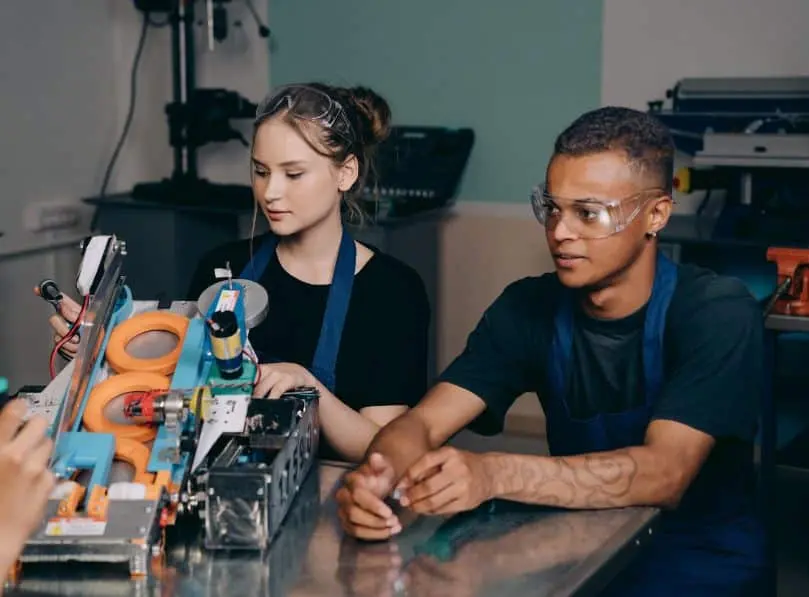Manufacturing Skills: The Key to Industry Success

Businesses having the latest technology and equipment are at an advantage. But these tools become less valuable when workers lack manufacturing skills to operate them. The real key to success in manufacturing is having skilled employees.
Investing in extensive manufacturing skills training for employees is a smart move. Read on to learn more about essential skills to succeed in the manufacturing industry.

Importance of Manufacturing Skills
The manufacturing industry depends a lot on its workers' skills. As technology and processes evolve, workers need to keep getting better. Here are the some of the importance of manufacturing skills:
Economic Growth:
Manufacturing skills drive productivity and create more jobs, which helps economies grow in many countries.
Product Quality:
Skilled workers make sure products are always good, making customers happy and companies look good.
Innovation and Technology:
Skilled workers are crucial for using and introducing new technologies and ideas in production.
Global Competitiveness:
A country with good manufacturing workers makes them strong in the world market and helps businesses succeed.
Resource Efficiency:
Manufacturing skills help save resources by reducing waste and making things more efficient. This saves money and helps the environment.
Technical Manufacturing Skills Must-haves
As machines become more common in the workplace, employees need to learn how to use new software and systems. Employees need to stay on top of the latest technologies to keep manufacturing operations running smoothly. This means having a solid grasp of these technical manufacturing skills:
Machine Operation:
Be proficient at using different machines in the industry, such as CNC machines, lathes, and milling machines. Learn how to work their controls, follow safety rules, and do maintenance. Knowing safety rules and using machines safely is a must.
Blueprint Reading and Materials Knowledge:
Understand engineering drawings and blueprints to make accurate products.
Quality Control, Inspection, and Troubleshooting:
Learn how to use measuring tools and techniques. They help keep products good and find problems easily. Keeping machines and equipment working well in production involves solving technical problems.
Materials Expertise:
Become knowledgeable of the materials used in manufacturing and their properties for their best use.
Soft Manufacturing Skills: People Skills
Manufacturing is all about people. While technical skills are fundamental, strong people skills are essential to employees in the manufacturing industry.
Communication:
Communication is crucial for sharing information and instructions. Clear and effective communication allows coworkers to coordinate with smoothly. This ensures everyone is on the same page about goals and processes.
Teamwork:
Manufacturing often involves working in teams to achieve production goals. Being a cooperative team player who contributes to the group's success is valuable.
Problem-Solving:
Identifying and resolving issues in the manufacturing process. This skill enables quick response to tough situations and early problem-solving.
Adaptability:
Manufacturing environments can change due to shifts in demand or unexpected challenges. Being adaptable and open to change helps in maintaining productivity.
Time Management:
Ensuring effective time management helps in meeting production deadlines.
Safety Manufacturing Skills
Safety is vital in the manufacturing industry. Keep learning safety protocols and improving skills to do well in manufacturing.
Here are safety manufacturing skills that are crucial to ensure a safe work environment:
Risk Assessment:
Finding potential hazards and issues in machinery or manufacturing processes is crucial. Detect and address safety concerns before they cause harm.
Safety Procedures and Protocols:
Know safety rules to be safe. Wear protective gear and follow industry standards.
Equipment Operation Safety:
Knowing how to operate manufacturing machinery and equipment safely is essential. This includes understanding emergency shut-off procedures and safe operation techniques.
Hazard Communication:
Inform coworkers about dangers. This includes labeling chemicals and making sure everyone knows how to stay safe.
Emergency Response:
Know how to properly respond to emergencies such as fires, chemical spills, or injuries. This includes first aid training and understanding evacuation plans.
Working with heavy machinery, dangerous materials, and physical labor poses occupational hazards. It is important to focus on safety over profits. Learn company's safety rules well. Do not be afraid to say something when seeing anything unsafe. Training in safety, such as first aid, CPR, and how to use equipment safely, helps stop accidents and keeps coworkers safe.
Tips to Improve Manufacturing Skills
Improve manufacturing skills by focusing on continuous learning. The industry is always changing, so it is crucial to keep up with modern technologies and methods.
Take online courses: Online courses on lean manufacturing, Six Sigma, and other topics are on tutorial websites. Getting certified in these areas shows employers of being knowledgeable.
Learn on the job: Learn from coworkers, ask for help, and practice independently to improve skills.
Attend workshops: Find workshops and conferences on quality control, safety, and data analysis in manufacturing.
Find a mentor: Ask a tenured coworker in manufacturing for mentorship. Consider mentoring others to improve skills.
Stay current with trends: Read magazines and follow big manufacturing companies on social media. Know where the manufacturing industry is headed to become a more attractive company hire.
The manufacturing industry is always changing. Make sure to learn more and gain new manufacturing skills over time.
Conclusion
In-demand manufacturing skills are changing fast because of evolving technology. Companies that help their employees keep learning and improving do well eventually. People who are knowledgeable at what they do are more valuable.
Businesses must invest in teaching and training their workers. Skills and competency framework help identify skills gaps among workers. This helps employees like their jobs more, do better work, and stay loyal to the company. Having workers with the right skills make the manufacturing industry successful.
Insights You Need to Get It Right







